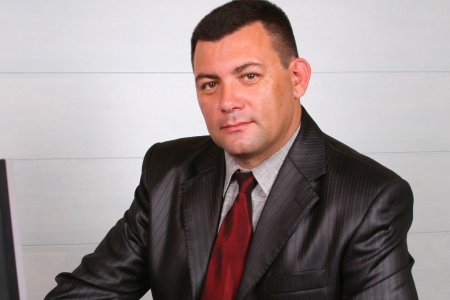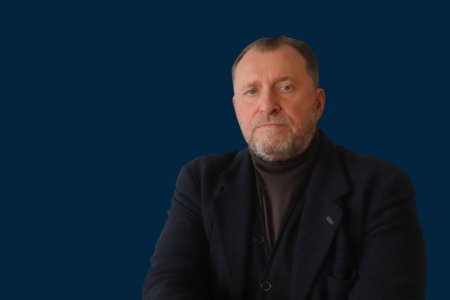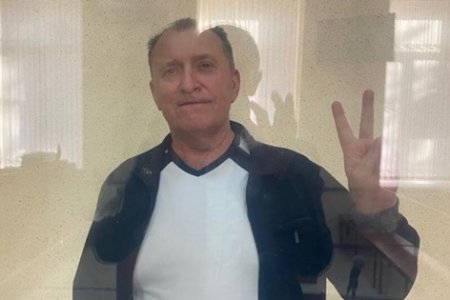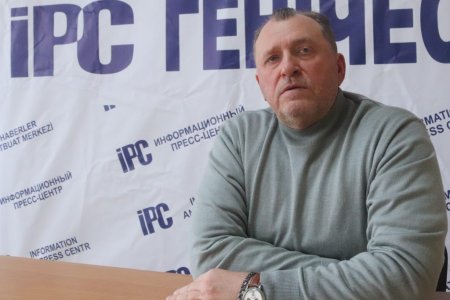
A fake ‘court’ in Russian-occupied Henichesk (Kherson oblast) has sentenced “a local resident” to three years and two months’ imprisonment in a maximum security prison colony on nonsensical and legally nihilistic charges of “involvement in an unlawful armed formation”. Although no name is given, it is very likely that the person is Hennadiy Osmak, the former editor of the Henichesk website ‘Novy Vizyt’ who was abducted from his home in Henichesk in early March 2024.
As reported, Hennadiy Osmak was Chief Editor of Novy Vizyt in Henichesk for many years but announced on 12 March 2022 that the publication was suspending its work. He wrote that “as the Editor, I am forced to state that, as from today, I have no relation to the Novy Vizyt site, nor to any information that is posted there.” Russia has set about controlling all media as soon as it seizes any Ukrainian territory and had presumably decided to take over Novy Vizyt. By the end of March 2022, the website had begun producing reports about the occupation ‘authorities’, however it then ceased publication altogether, perhaps because other members of staff proved just as unwilling to collaborate as Osmak. Ukraine’s Institute for Mass Information reported in March 2024 that nothing had been heard of Osmak following the 12 March statement posted on his Facebook page, and even the latter was now closed.
The Russian propaganda site MASH reported on 7 March 2024 that Osmak had been “detained”. The report was full of inaccuracies both about the Ukrainian journalist and about the organization he was accused of involvement in, and the claim that he “fled” to Russia should probably also be viewed with scepticism. The aggressor state has made it impossible to retain private property on occupied territory, receive healthcare or other vital requirements, without a Russian passport. This does not equate to “replacing Ukrainian citizenship with Russian”.
MASH claimed that Osmak had been the ‘PR manager’ for the Noman Çelebicihan Battalion, falsely labelling the latter “the Ukrainian Armed Forces nationalist battalion of Crimean Tatars” and making other totally unfounded assertions, including that the Battalion had organized sabotage in occupied Crimea. Osmak had supposedly been denounced, seized and charged, under Russian legislation, with ‘participation in an unlawful armed formation’. MASH asserted then that he faced up to 15 years in prison, with the sentence likely to be lengthened if it “transpired that he was a sleeping agent from Ukraine’s Security Service”.
On 15 August, the Russian occupation ‘Kherson regional prosecutor’ reported that the so-called ‘Henichesk district court in Kherson oblast’ had found a 55-year-old local resident guilty of Article 208 § 2 of Russia’s criminal code (“participation in the activities of an unlawful armed formation acting on the territory of a foreign country for purposes which are against the interests of the Russian Federation”. Although no name was given, the claims correspond to those made about Osmak in March 2024, namely that the person was involved in providing what the report calls “information propaganda support for the activities of the Battalion.”
It is, indeed, true that the main objective of the Noman Çelebicihan Battalion was the blockade of occupied Crimea from mainland Ukraine, however this is the only truthful part of the brief report. The Noman Çelebicihan Battalion was neither an armed, nor an unlawful, formation. It was founded at the beginning of January 2016 by Crimean Tatar activist and businessman Lenur Islyamov, with the first members people who had taken part in the civic blockade of occupied Crimea. This was initiated in September 2015 by Crimean Tatar leaders with specifically human rights demands, including release of the ever-mounting number of political prisoners and freedom of speech. Although Ukraine had stopped providing water from the Dnipro after Russia’s invasion, it had continued providing electricity, with trade also continuing. This was clearly convenient to the invading power, and the blockade, which soon began government policy, a major annoyance. Neither that, however, nor the Battalion’s ultimate objective, namely the end to Russian occupation, made its activities illegal.
It should be stressed that Russia’s application of its legislation would, in any case, be in violation of international law, as well as fundamental principles of jurisdiction.
According to the Crimean Tatar Resource Centre, Russia is persecuting at least 46 Ukrainian citizens on charges over the Noman Çelebicihan Battalion. In reporting this latest sentence and the number of people persecuted, the Memorial Support for Political Prisoners Project noted that they have declared 13 of the men political prisoners. That figure would certainly be higher were the prosecutions not so disturbingly anonymous, with reports of men’s ‘arrests’ and sentences often reported without names or any other details. The number of such prosecutions has escalated dramatically since the full-scale invasion of Ukraine, with this especially preposterous given that the Battalion has long since ceased to exist. It was not functioning even on 1 June 2022 when Russia’s increasingly politicized supreme court labelled the peaceful formation ‘a terrorist organization’. That ruling was almost certainly aimed at providing another weapon of persecution against people abducted from occupied Kherson oblast and has become a conveyor belt of repression with convictions essentially guaranteed. The Supreme court ruling essentially enables the FSB to generate multiple prosecutions without any evidence of an actual crime. No proof is needed even of genuine involvement in the Battalion as Russia uses anonymous ‘witnesses’ whose identity is concealed and who may never have set eyes on the person charged.
Strip the charges against Hennadiy Osmak of the ‘terrorism’ coating obligingly provided by the supreme court ruling and you are left with a Ukrainian citizen, living in his own Ukrainian city, charged with “actions directed against the interests of the Russian Federation”, that is, against the aggressor state illegally occupying his Ukrainian home.



